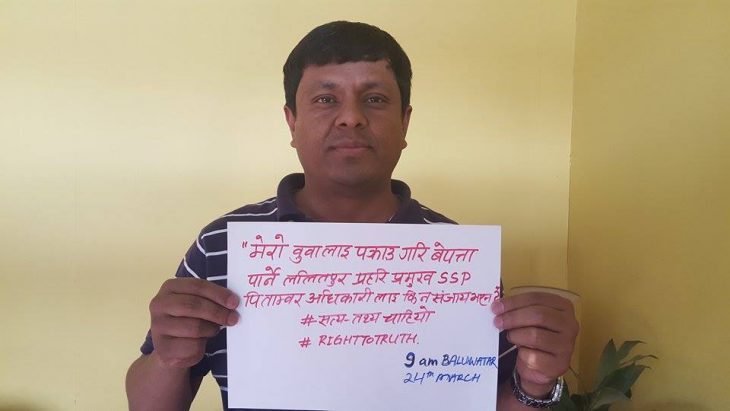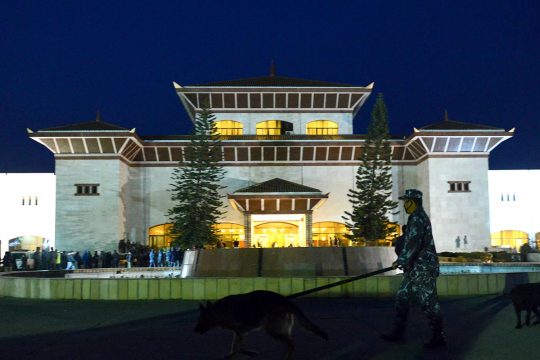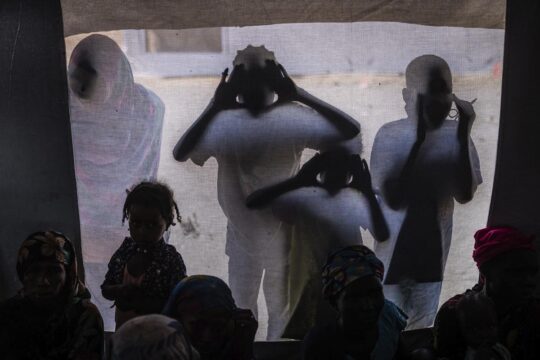“Let's not be afraid to be left alone if it's for the sake of the truth…" stated Oscar Arnulfo Romero of El Salvador, who was killed on 24th March 1980 in his struggle on searching for truth. The United Nations General Assembly (UNGA) adopted this date to mark the day as international day of right to truth in respect of his struggle and in respect of all the struggles worldwide for the victims and their dignity.
March 24th marks the 6th annual International Day for the Right to Truth Concerning Gross Human Rights Violations and for the Dignity of Victims. The UNGA proclaimed this day in 2010 to honour the memory of victims and recognize the work of countless human rights activists around the world who have devoted their lives to the pursuit of truth in the face of grave injustice. This week has a meaning for larger communities and nations to respect and commemorate the day, which provides an occasion to remind ourselves that all victims and their relatives have a ‘Right to Truth’ to the fullest extent possible the fate of loved ones who were disappeared, tortured, raped, killed during violent conflicts. “Right to truth” has special relevance at a time when the powers are threatening those who seek truth and justice.
Campaigning for the right to the truth about enforced disappearances began in Latin America in the 1980s. The UN Working Group on Enforced or Involuntary Disappearances and the Inter-American Commission on Human Rights began to assert a right to the truth concerning the disappeared based on Article 32 of the 1977 Additional Protocol to the 1949 Geneva Conventions, which identified “the right of families to know the fate of their relatives” in the context of armed conflict. Victims, the relatives of the disappeared, have the non-derogable right to know the truth about the circumstances in which violations took place and, in the event of death or disappearance, the victim’s fate. There is an obligation in international law for the state to remember the past and to avoid denial or revisionism that includes a duty on the state to clarify the truth about past events and the history of violations, not least in order to avoid recurrence.
Truth for victims
In the context of Nepal, truth for victims has been systematically ignored and repressed for the better part of a decade since the end of the armed conflict (1996-2006), particularly for the families of the disappeared. The post conflict political settlement that allowed the rebellions to become part of the government has produced an unholy alliance of political actors incentivized to hide the truth at all costs, leading to the entrenchment of a culture of impunity that would seek to absolve perpetrators of responsibility in the name of national progress were it not for various supreme court rulings. Nepal’s decade long armed conflict saw thousands of ordinary people become victims of both parties to the conflict, with thousands killed, wounded, tortured and displaced. Perhaps the most enduring legacy of conflict however are the enforced disappeared, whose families still wait for information about the fate of loved ones and for the chance, where they are dead, to retrieve their remains and ensure appropriate rituals are made. Whilst the original ceasefire agreement, and many consequent agreements, committed to addressing the issue of the disappeared, a decade after the signing of the Comprehensive Peace Accord, no progress has been made on behalf of victim’s truth and justice. For families of the disappeared, the conflict continues as long as the many impacts of disappearance are unaddressed. By trying to brush the dirt of the conflict under the carpet, through a general amnesty and by protecting those accused of war crimes, the state is rubbing salt in the wounds of the families of victims. The party of rebels that unleashed the bloodshed sits in power, and does its best to ensure general amnesty with the acquiescence of its erstwhile enemies. It is hard to imagine that the kidnappings, disappearances, extrajudicial killings, rape and torture will ever be thoroughly investigated.
Violent past
Truth can be only prior factor of many factors of political transition from a violent past. After the official end of the conflict in 2006, high hopes emerged for transition, but after ten years of waiting, the demands of victims remain unheard. The perpetrator-centered transitional justice mechanisms serve the state with little efforts made for victim-centered action. Victim’s hope for truth and justice, level of trust, independency and competency to dealing with the past of the both ineffective transitional justice mechanisms – truth and reconciliation commission TRC and commission of Investigation on enforced disappeared persons CIEDP – are declining.
Hundreds of disappeared citizens are forgotten and families continue to suffer. Victims’ role in transition, their key demands of truth seeking, justice and livelihood, and psychosocial needs are undermined. The question of truth and justice is being compromised by the politics of crime. The question of victims’ socio-economic needs is deviated through the politics of justice without recognizing victim’s right to truth and the broader issue of reconciliation. The perpetrator led transitional justice process is not supportive to the victims of violence and failed to addressing victims needs, as the parties have set up transitional justice mechanisms as part of a political package deal and failed to establish a victim-centered approach to justice, such mechanisms will not address root causes of conflict, grave violations of human rights and politically motivated crimes such as rape, torture and enforced disappearances. Nepal transitional justice act and the new constitution both failed to criminalize enforced disappearance as a crime against humanity. Instead the state institutions have protected the criminals and the state denial continues.
"autonomous right"
The right to truth is known as an ‘autonomous’ right. The victims’ right to know the fate of relatives stands in addition to their right to justice. The right to truth also has the character of a ‘collective’ right, meaning it is also articulated as a society’s right to know the history of its own oppression. The armed conflict involves direct acts of violence, but wars leave social, political and economic legacies that linger long - what victims still face today in the aftermath of conflict, twenty years since the beginning of war and ten years after the peace agreement. How long should the victims of political crimes and human rights abuses wait for the truth?
The last 20 years has been lost to conflict and post conflict transition efforts, but more than 1400 citizens whereabouts are still unknown resulting in frustration and anger. The dark night of the disappeared still exists, the long list of disappeared continues, whose lives have been stolen from their families and communities. The endless suffering of the families and their passion to know the truth is sadly waning. Living with ambiguity, the disappearance is one of the most devastating tragedies a family could ever endure. As for the commemorative events, the human approach of disappearances should be protected and the victim’s rights must be guaranteed in order to effectively rebuild the society.
Argentina’s writer Julio Cortazar (1981) writes that “It is necessary to maintain in an obstinate present, with all its blood and all its disrepute, something that it’s already being made to enter the comfortable world of oblivion; it is necessary to continue considering as alive those that perhaps are not but that we have the obligation of claiming, one by one, until the answer finally shows the truth that today it is intended to be hidden.”
Reconciliation
This day made us re-visit to our recent past violations, struggle to searching truth, initiatives of memory work and failings on transitional justice process. Transitional Justice mechanism has been itself a lost step amongst conflict victims’ community. Majority victims living in rural areas do not understand and internalize the commissions’ way of dealing and their delivery where they are continuously ignored and the victim’s daily sufferings grow without ‘answer’ and addressing their needs. Truth is the first priority to be made public, if we are really envisioning for reconciliation and sustainable peace in future.
Should the state led transitional justice mechanisms move ahead as planned, the voices of victims could be sidelined in favor of perpetrator amnesty and forced reconciliation. There is active collusion between the state security forces and the former rebels, both sit in power, to keep the truth buried. The coalition government and political gambling aren’t only protecting the criminals, also rewarding the alleged perpetrators and deepening a culture of impunity.
Faulty commissions
The faulty commissions act may not find the historic truth as it is without necessary amendment, which may recommend amnesty for serious crimes, and will not address the pain of victims of violence. UN human rights body – OHCHR recently made public their position on Nepal transitional justice commissions that the both TRC and CIEDP may not contribute in the victims truth seeking and justice process without amendment on its faulty act as the conflict victims common platform already mentioned their distrust and disappointment of the commissions’ anti-victim move after a year of the commission, the formal TJ mechanisms in Nepal are about to dismiss without delivering any significant result and hope for justice, as both the commissions have failed to dig a justice path and create a mutual trust amongst primary stakeholders in more than one year time – in a two year of their mandate. If the victims’ rights agenda related to truth seeking, memory, justice and livelihood left unaddressed, the grief of relatives of victims will fester and turn to revenge in the future.
We call upon Government and concerned agencies to immediately criminalize the enforced disappearance and disclose the truth to respect victims’ right to know in order to advance the efforts of peace and reconciliation. The Government of Nepal and other nations should ratify the International Convention on the protection of all persons from enforced disappearance. It is time to appeal to all members of society, political parties, agencies and international community to create a common pressure to make public all the disappeared, disclose the truth of violence and to respect the dignity of victims without delay. A shared truth and justice concerning the past can overcome a sense of victimization and contribute to the creation of a basis for individual and societal peace and reconciliation, yet no initiatives have been taken towards the truth.






